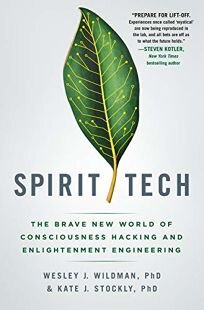The electrodes are already attached to your scalp, so you settle into a seat that reminds you of the one they use at the dentist’s office. On the other end of a series of cords is a machine where a technician sits with a clipboard and a range of blinking and bleeping devices.
No, you’re not about to start a medical diagnostic exam.
You’re about to meditate.
Sound surreal? If so, welcome to the brave new world of “spirit tech,” where a range of researchers and practitioners are using brain based tech to “trigger, enhance, accelerate, modify, or measure spiritual experience.”
In their new book — Spirit Tech: The Brave New World of Consciousness Hacking and Enlightenment Engineering — Wesley J. Wildman and Kate J. Stockly take a stimulating journey into the technology that could shape our spiritual futures.
Investigating the intensifying interaction between technology and religion, they talk to innovators and early adopters who are "hacking the spiritual brain” using ultrasounds to help practitioners meditate or experimenting with “high-tech telepathy” to build a “social network of brains.”
Not only did I get the chance to read the book, I also sat down with a one-on-one interview with Stockly about how spiritual entrepreneurs and tech-savvy religious practitioners are using technology to modify spiritual experiences.
While critics may question “spirit tech’s” efficacy, elitism, and ethics, Wildman and Stockly are careful to note that religious people have always used tools — from mantras to mandalas, prayer beads to palm reading — to enhance spiritual experience. The difference now, they write, is the sheer number of “customizable and exploratory practices at the threshold between cutting-edge tech and the soul,” from synthetic psychedelic trips in lieu of Holy Communion to LED orbs that create connection between congregants.
Wildman and Stockly do not pretend to have it all figured out — spirit tech’s ability to balance innovation and enlightenment, they say, “is still being written” — but their thought-provoking introduction to the brave new world of transcendent tech gives both pious pioneers and defenders of traditional religion something to consider as they imagine the future of spirituality in the 21st-century and beyond.

